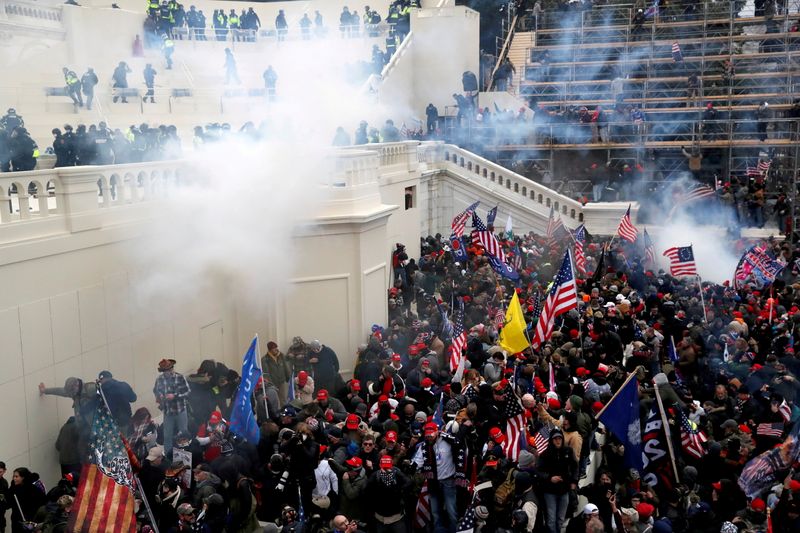By Mark Hosenball
WASHINGTON (Reuters) - Nearly five months after hundreds of Donald Trump supporters launched a deadly assault on the U.S. Capitol, prosecutors have not carried out an early threat to charge some participants with seditious conspiracy.
They may never do so, according to a law enforcement official and legal experts, because of prosecutors' past difficulty in securing convictions on those charges against far-right activists.
Instead, the more than 440 people charged with joining in the Jan. 6 violence that left five people dead including a Capitol Police officer have been charged with crimes ranging from entering a restricted building to criminal conspiracy.
These differ from a charge of seditious conspiracy alleging attempts "to overthrow, put down or to destroy by force the government of the United States."
Federal prosecutors first raised the idea of charging Capitol rioters with seditious conspiracy at a Jan. 26 news conference.
"One of the more significant charges people are very familiar with is the sedition conspiracy. That's what we're trying to build towards," said Michael Sherwin, who at the time was acting as chief federal prosecutor for the District of Columbia.
Sherwin did not immediately reply to a request for comment.
A law enforcement official, who asked for anonymity to discuss debates among prosecutors, said there had been little recent discussion among key officials regarding seditious conspiracy charges, which carry a maximum sentence of 20 years in prison.
The official said that historically, federal prosecutors have encountered obstacles when they have tried to prosecute alleged far-right activists on such charges.
"Seditious conspiracy is a vague and overbroad statute that could be used to criminalize some legitimate forms of protest and much mundane criminal activity," said Joshua Braver, an assistant professor at the University of Wisconsin Law School.
"The statute's revival is recent and the statute was dying a slow and quiet death; it would be a mistake to resuscitate it," he said.
Justice Department spokesman Marc Raimondi declined to comment on the department's current views on bringing seditious conspiracy charges, referring a journalist to prior court documents and news releases.
Then-President Trump was impeached by the U.S. House of Representatives and acquitted by the Senate on a charge of inciting insurrection in a fiery outdoor speech before the Capitol assault. Some accused rioters have said they believed they were following Trump's directions.
MIXED RECORD
Over the years, the Justice Department obtained seditious conspiracy convictions against Puerto Rican nationalists and alleged Islamist militants including Sheikh Omar Abdel Rahman, the radical Islamic clergyman known as the "Blind Sheikh."
Seditious conspiracy charges featured prominently in a case federal authorities brought in 1987 against leaders and members of a neo-Nazi group known as The Order. Fourteen alleged members or supporters were indicted, with 10 facing seditious conspiracy counts.
After a two-month trial, a jury acquitted all defendants.

Kathleen Belew, a University of Chicago academic who has testified before Congress about the white supremacist movement, said the Justice Department had "put a lot of effort" into the trial of Order leaders but that the trial turned out to be a "disaster."
She said seditious conspiracy charges have proven to be a problem for prosecutors because the "burden of proof is quite high" and that failure of such cases at trial would make prosecutors "reluctant to try again."